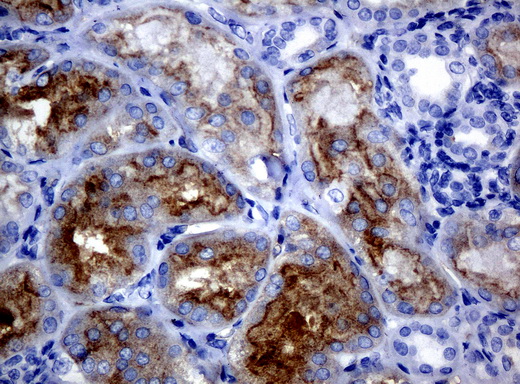PSMA (FOLH1) Mouse Monoclonal Antibody [Clone ID: UMAB26]
CAT#: UM570026
FOLH1 mouse monoclonal antibody,clone UMAB26
Size: 100 ul
View other "UMAB26" antibodies (2)
Special Offer: Get this product for $99/€99. Use code: "Truesample".
USD 665.00
USD 200.00
USD 867.00
Specifications
| Product Data | |
| Clone Name | UMAB26 |
| Applications | 10k-ChIP, IHC, WB |
| Recommended Dilution | WB 1:500, FLOW 1:100 |
| Reactivities | Human |
| Host | Mouse |
| Isotype | IgG1 |
| Clonality | Monoclonal |
| Immunogen | Full length human recombinant protein of human FOLH1(NP_004467) produced in HEK293T cell. |
| Formulation | PBS (pH 7.3) containing 1% BSA, 50% glycerol and 0.02% sodium azide. |
| Concentration | 0.5~1.0 mg/ml (Lot Dependent) |
| Purification | Purified from mouse ascites fluids or tissue culture supernatant by affinity chromatography (protein A/G) |
| Conjugation | Unconjugated |
| Storage | Store at -20°C as received. |
| Stability | Stable for 12 months from date of receipt. |
| Predicted Protein Size | 84.2 kDa |
| Gene Name | Homo sapiens folate hydrolase 1 (FOLH1), transcript variant 1, mRNA. |
| Database Link | |
| Background | This gene encodes a type II transmembrane glycoprotein belonging to the M28 peptidase family. The protein acts as a glutamate carboxypeptidase on different alternative substrates, including the nutrient folate and the neuropeptide N-acetyl-l-aspartyl-l-glutamate and is expressed in a number of tissues such as prostate, central and peripheral nervous system and kidney. A mutation in this gene may be associated with impaired intestinal absorption of dietary folates, resulting in low blood folate levels and consequent hyperhomocysteinemia. Expression of this protein in the brain may be involved in a number of pathological conditions associated with glutamate excitotoxicity. In the prostate the protein is up-regulated in cancerous cells and is used as an effective diagnostic and prognostic indicator of prostate cancer. This gene likely arose from a duplication event of a nearby chromosomal region. Alternative splicing gives rise to multiple transcript variants encoding several different isoforms. [provided by RefSeq] |
| Synonyms | FGCP; FOLH; GCP2; GCPII; mGCP; NAALAD1; NAALAdase; PSM; PSMA |
| Reference Data | |
| Protein Families | Druggable Genome, Protease, Transmembrane |
Documents
| Product Manuals |
| FAQs |
| SDS |
Resources
| Antibody Resources |
Other Versions
| SKU | Description | Size | Price |
|---|---|---|---|
| UM500026 | FOLH1 mouse monoclonal antibody,clone UMAB26 |
USD 564.00 |
|
| UM500026CF | Carrier-free (BSA/glycerol-free) FOLH1 mouse monoclonal antibody,clone UMAB26 |
USD 657.00 |
{0} Product Review(s)
Be the first one to submit a review






























































































































































































































































 Germany
Germany
 Japan
Japan
 United Kingdom
United Kingdom
 China
China












